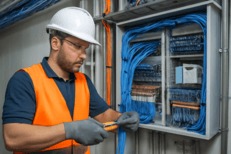When it comes to building systems, low voltage wiring plays an essential role in ensuring the proper functioning of many critical elements. Whether it’s for security systems, communications, or data transmission, low voltage wiring is integral to modern construction projects. However, installing these systems requires a high level of expertise to ensure that everything works safely, efficiently, and up to code.
This is where low voltage wiring contractors come into play. These professionals are responsible for ensuring that all low voltage wiring is installed correctly, safely, and meets the highest standards of quality. Let’s explore how low voltage wiring contractors ensure safety and quality in these installations.
The Importance of Low Voltage Wiring in Modern Construction
Low voltage wiring refers to the cables and systems that carry less than 50 volts of electricity, typically used for telecommunication, security, audio/visual systems, and networking. In today’s buildings, everything from internet access to security surveillance relies on these systems, making their installation crucial to the overall functionality of a space.
However, working with low voltage systems is not as simple as it may seem. Despite carrying less electricity than standard wiring, low voltage systems require careful planning, installation, and testing. Low voltage wiring contractors play a critical role in ensuring these systems are installed safely, operate correctly, and meet all relevant building codes and regulations.
How Low Voltage Contractors Ensure Safety in Low Voltage Wiring
1. Adhering to National Electrical Code (NEC) Standards
One of the main ways low voltage wiring contractors ensure safety is by strictly adhering to the National Electrical Code (NEC) and local regulations. The NEC outlines the safety standards for wiring systems, including low voltage systems, to prevent electrical hazards such as overheating, fires, or electrical shocks.
Low voltage wiring contractors are trained to follow these codes to ensure that the installation process minimizes risks. They are also knowledgeable about specific codes for different types of low voltage systems, such as fire alarms, CCTV systems, and data networks, ensuring that every system is installed according to best practices and legal standards.
Safety Benefits:
- Ensures all wiring is compliant with NEC codes, reducing the risk of accidents.
- Prevents hazards such as electrical fires and shock risks.
- Guarantees that all equipment is installed and connected safely.
2. Proper Wiring Techniques
The safety of a low voltage system starts with the proper wiring techniques. Low voltage wiring contractors have extensive knowledge of how to lay cables, organize them, and ensure that connections are made securely. They understand the importance of using the correct gauge of wire, securing cables with appropriate brackets, and ensuring that cables do not come into contact with sources of heat or moisture.
For example, contractors ensure that cables are neatly bundled and not subject to wear or damage. If wires are tangled or improperly routed, they could be at risk for damage, which can lead to failures or even electrical fires. Contractors also ensure that all terminations and connections are done properly, using appropriate connectors, to avoid loose connections that could result in short circuits.
Safety Benefits:
- Prevents improper wiring practices that could lead to malfunctions or accidents.
- Ensures all wires are securely installed and protected from external factors.
- Avoids wear and tear that could compromise the safety of the system.
3. Using Certified Equipment and Materials
For any installation, using high-quality materials is essential to ensuring safety and longevity. Low voltage wiring contractors work with certified equipment and materials that meet industry standards for performance and safety. Whether it’s the cables themselves, connectors, or junction boxes, contractors only use products that have been tested and certified for low voltage applications.
Certified materials ensure that the wiring systems will function correctly for the long term, reducing the chances of equipment failure due to subpar components. They also ensure that the wiring can handle the necessary load without overheating or suffering from undue stress.
Safety Benefits:
- Reduces the risk of using subpar materials that could fail or cause hazards.
- Ensures long-lasting, reliable wiring systems.
- Guarantees that all components are tested for safety and performance.
How Low Voltage Contractors Ensure Quality in Low Voltage Wiring
4. Comprehensive Testing and Troubleshooting
Once the installation is complete, low voltage wiring contractors thoroughly test the entire system to ensure that everything is functioning properly. Testing may include checking for signal quality in networking cables, verifying the performance of security systems, or ensuring that data transmission systems are working seamlessly.
Troubleshooting is another essential service provided by contractors. If any issues arise during the testing phase, contractors have the expertise to identify the root cause and resolve it quickly. Whether it’s fixing a poor connection, recalibrating systems, or replacing faulty components, these contractors ensure that systems meet the required performance standards.
Quality Benefits:
- Guarantees that all systems work properly after installation.
- Identifies and addresses issues promptly to prevent future problems.
- Provides peace of mind by ensuring system reliability.
5. Customized Solutions for Specific Needs
Every construction project is unique, and low voltage wiring contractors offer customized solutions tailored to the specific needs of a building. Whether the project involves complex audio/visual systems for a theater, an integrated security system for a commercial building, or extensive data networks for a corporate office, contractors design and install systems that are best suited to the building’s requirements.
Custom solutions ensure that the installation is optimized for efficiency, performance, and safety. This tailored approach is key to ensuring that all systems perform reliably over the long term, without unnecessary waste or inefficiencies.
Quality Benefits:
- Ensures that systems are designed to meet the specific needs of the space.
- Increases operational efficiency by customizing the installation to match requirements.
- Provides a more reliable and optimized solution for the client.
6. Ongoing Support and Maintenance
After installation, low voltage wiring contractors offer ongoing support and maintenance services to keep systems running smoothly. Whether it’s routine check-ups, repairs, or upgrades, having a professional team to rely on ensures that the system remains high-quality throughout its lifespan.
Maintenance includes checking for wear and tear, updating software or firmware, and replacing outdated components. Contractors also help troubleshoot any issues that may arise and ensure that all systems continue to meet safety and performance standards.
Quality Benefits:
- Ensures long-term system performance with regular maintenance.
- Minimizes downtime by addressing issues before they become major problems.
- Keeps systems up to date and running at peak performance.
Conclusion
Low voltage wiring is an essential component of modern construction, and ensuring its safety and quality is vital for the success of any project. Low voltage wiring contractors play a crucial role in guaranteeing that these systems are installed correctly, safely, and efficiently. From adhering to industry standards and using high-quality materials to providing ongoing maintenance, contractors ensure that low voltage systems perform optimally and last for years.
By working with qualified low voltage wiring contractors, construction companies and building owners can rest assured that their wiring systems are safe, reliable, and of the highest quality. Their expertise ensures that the systems continue to operate seamlessly, preventing costly downtime and ensuring the success of every project.



